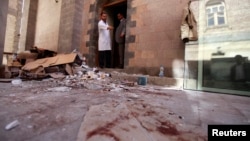CAIRO —
Following a public outcry about an attack on a hospital inside Yemen's Defense Ministry on December 5, the leader of al-Qaida's Yemen affiliate, Qassem al Raymi, apologized for the choice of targets and vowed to pay compensation to families of the victims.
The top commander of the Yemeni branch of al-Qaida insisted in an Internet video that militants who attacked the country's Defense Ministry had “disobeyed orders” to avoid hitting a hospital and mosque inside the ministry compound.
Yemeni state TV recently broadcast closed-circuit video of the al-Qaida militants gunning down and throwing a grenade at civilians inside the ministry's hospital. The images have provoked a strong public backlash against the group.
In an apparent bid to regain public sympathy, al Raymi said that families of victims of the attack would receive “blood money.” He went on to claim the intended target of the attack was an “operations room” used for U.S. drone strikes.
The U.S. has conducted a series of drone strikes against al-Qaida targets across Yemen during the past several years, in conjunction with the Yemeni military. The Yemeni press has frequently criticized the attacks for also killing civilians.
Hakim Almasmari, editor-in-chief of the Yemen Post newspaper, told VOA the al-Qaida attack earlier this month did a great deal of damage to the group's image among ordinary Yemenis who may have been ambivalent about the group's goals.
"This attack made al-Qaida very unpopular in Yemen. Though it has some sympathizers, due to the U.S. drone strikes that kill civilians, this attack really showed that they are very, very ruthless when it comes to killing civilians. It's not enough to apologize and say that they will pay compensation," said Almasmari.
Almasmari added that al-Qaida is “still a force to be reckoned with” across large swathes of Yemen, including parts of Hadramout, Abyane and Shabwa provinces. The group, he said, has been gaining strength, “mostly due to the government's weakness,” rather than through its own inherent strength.
Dr. Ali Mohamed Othman, who worked at the targeted hospital, told Yemeni state TV that the attackers were “brutal and cruel,” and “attacked anyone and everyone.” “Such people,” he insisted, “cannot claim to be fighting in the name of Islam and do such things.”
The top commander of the Yemeni branch of al-Qaida insisted in an Internet video that militants who attacked the country's Defense Ministry had “disobeyed orders” to avoid hitting a hospital and mosque inside the ministry compound.
Yemeni state TV recently broadcast closed-circuit video of the al-Qaida militants gunning down and throwing a grenade at civilians inside the ministry's hospital. The images have provoked a strong public backlash against the group.
In an apparent bid to regain public sympathy, al Raymi said that families of victims of the attack would receive “blood money.” He went on to claim the intended target of the attack was an “operations room” used for U.S. drone strikes.
The U.S. has conducted a series of drone strikes against al-Qaida targets across Yemen during the past several years, in conjunction with the Yemeni military. The Yemeni press has frequently criticized the attacks for also killing civilians.
Hakim Almasmari, editor-in-chief of the Yemen Post newspaper, told VOA the al-Qaida attack earlier this month did a great deal of damage to the group's image among ordinary Yemenis who may have been ambivalent about the group's goals.
"This attack made al-Qaida very unpopular in Yemen. Though it has some sympathizers, due to the U.S. drone strikes that kill civilians, this attack really showed that they are very, very ruthless when it comes to killing civilians. It's not enough to apologize and say that they will pay compensation," said Almasmari.
Almasmari added that al-Qaida is “still a force to be reckoned with” across large swathes of Yemen, including parts of Hadramout, Abyane and Shabwa provinces. The group, he said, has been gaining strength, “mostly due to the government's weakness,” rather than through its own inherent strength.
Dr. Ali Mohamed Othman, who worked at the targeted hospital, told Yemeni state TV that the attackers were “brutal and cruel,” and “attacked anyone and everyone.” “Such people,” he insisted, “cannot claim to be fighting in the name of Islam and do such things.”








